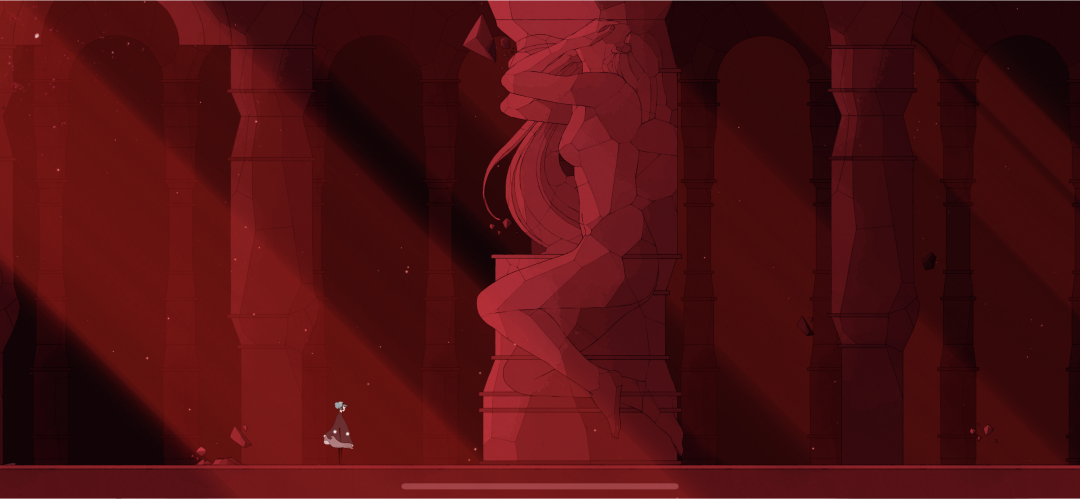Setup: iPhone, iOS 13 Beta
Developer: Nomada Studios
Publisher: Devolver Digital
Original Release Date: 12/13/2018 (PC/Switch), 8/21/2019 (iOS)
Platforms: macOS, Microsoft Windows, Nintendo Switch, iOS
Ever since hearing other game critics and journalists and bloggers rave about it towards the very end of 2018, Gris has been on my “need to play” list. The first thing that really grabbed me about the game — as I’m sure it will grab you — is the art. My god, is this game absolutely beautiful. Every frame of Gris truly is a painting, a feast for the eyes. How many more metaphors can I pack in here to convey to you that Gris is a visual masterpiece?
So of course, when I heard that Gris was coming to mobile devices, I was excited! I’m a big proponent of mobile gaming and of letting people have a chance to play anything and everything, regardless of platform. Having a game like Gris in the App Store can only elevate the mobile platform, not detract from it.
The opening moments took my breath away. As the eponymous protagonist loses her voice and falls down to earth, the game’s score, by Barcelona, Spain-based band Berlinist, swells and swirls around you. Usually when a game says “headphones preferred,” I ignore it, but seriously — wear headphones when you play this.

It’s unfortunate that there’s gameplay to talk about, because if Gris were a movie, I would be up there with the folks raving about how great it is. We can all see the title of this review, though, so we know how this is going to end.
At its core, Gris is a puzzle-platformer. There aren’t that many enemies, there are no death-states, and for the most part, the puzzles aren’t that difficult — to start with. For about 60 percent of my playthrough, I had a good time.
You guide Gris through this broken world that looks like it could have come straight out of a Moebius comic, or a scene from Fantasia, or even a Lotte Reiniger animated film. She regains her powers, including a limited double-jump/glide ability; a move where she turns into a heavy cube used for smashing certain weak platforms; the ability to swim; and eventually, her singing voice. And as she regains these powers, she’s also revitalizing the earth around her.
Early on, when your powers are constrained to “is large cube” and “can jump better,” navigating the world can be challenging, but certainly not frustrating. Platforms might disappear or move, which means you have to have the right timing or build up the right rhythm of movement to continue. Gris walks at a consistent pace, and when she’s on land, the movement controls are acceptably responsive. It’s when she gets in the water that we start to have problems.

I don’t know how this mechanic plays out on PC or Nintendo Switch, but swimming on iOS using a virtual analog stick was a mistake, y’all. I didn’t notice it while I was playing through the underwater level, but when I had to start combining my powers — swimming, then jumping out of the water, then using my double jump and a boost from some butterflies to get up to a far-up platform —this is where I started pulling my hair out. To call underwater movement in Gris imprecise would be too nice. It’s nearly impossible to do consistently. Add to this a weird VVVVVV-style gravity flip mechanic in the late levels, and you’ve got yourself a bad time.
It’s actually kind of jarring. Because in playing the rest of this game, I could tell that developer Nomada Studios put a lot of effort, time and thought into everything, including the mechanics. When Gris is good, it runs like clockwork. When this game is good, I have fun simply sightseeing on my way to the next challenge. When it’s bad, however, it’s like a discordant note in a beautiful melody — extremely unpleasant and extremely noticeable.
I don’t know if there’s even a way the studio could fix this. The virtual analog stick seems to be the default method of player movement when developers don’t want their mobile players to have to deal with a messy user interface. In most games, it works just fine, but Gris gives us a pretty stark example of what might happen when it just flat-out does not work for certain mechanics. I noticed similar weird movement issues in Hyper Light Drifter, but never once did I get to the point in that game where I had to stop playing out of frustration.
I haven’t beaten Gris yet. I really want to. It feels like I’m pretty close to doing so. But the idea that I’ll have to do more swimming to get to the end is kind of souring me on the proposition. Maybe the PC/Switch versions are better. If you have access to those systems and you want to play there, I’d say go for it, let me know how swimming feels there. If you really, really want to play on iOS, well, it’s your $4.99.

Follow us on Twitter, Instagram and Facebook. If you want to support No Escape with dollars I guess, check out our Patreon!





I love Gris myself, but I can definitely see how it doesn’t workout on mobile. I was a little suprised to see it go mobile honestly. I played on the Switch myself and didn’t have as significant of issues with the combined skills as you seemed to have. Compared to other platformers I have played on the Switch, controlling felt consistent to other games.